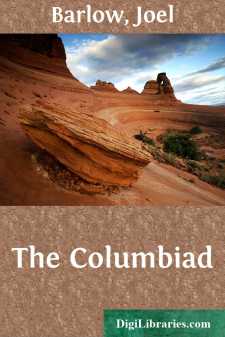Categories
- Antiques & Collectibles 13
- Architecture 36
- Art 48
- Bibles 22
- Biography & Autobiography 813
- Body, Mind & Spirit 142
- Business & Economics 28
- Children's Books 17
- Children's Fiction 14
- Computers 4
- Cooking 94
- Crafts & Hobbies 4
- Drama 346
- Education 46
- Family & Relationships 57
- Fiction 11829
- Games 19
- Gardening 17
- Health & Fitness 34
- History 1377
- House & Home 1
- Humor 147
- Juvenile Fiction 1873
- Juvenile Nonfiction 202
- Language Arts & Disciplines 88
- Law 16
- Literary Collections 686
- Literary Criticism 179
- Mathematics 13
- Medical 41
- Music 40
- Nature 179
- Non-Classifiable 1768
- Performing Arts 7
- Periodicals 1453
- Philosophy 64
- Photography 2
- Poetry 896
- Political Science 203
- Psychology 42
- Reference 154
- Religion 513
- Science 126
- Self-Help 84
- Social Science 81
- Sports & Recreation 34
- Study Aids 3
- Technology & Engineering 59
- Transportation 23
- Travel 463
- True Crime 29
The Columbiad
by: Joel Barlow
Description:
Excerpt
In preparing this work for publication it seems proper to offer some observations explanatory of its design. The classical reader will perceive the obstacles which necessarily presented themselves in reconciling the nature of the subject with such a manner of treating it as should appear the most poetical, and at the same time the most likely to arrive at that degree of dignity and usefulness to which it ought to aspire.
The Columbiad is a patriotic poem; the subject is national and historical. Thus far it must be interesting to my countrymen. But most of the events were so recent, so important and so well known, as to render them inflexible to the hand of fiction. The poem therefore could not with propriety be modelled after that regular epic form which the more splendid works of this kind have taken, and on which their success is supposed in a great measure to depend. The attempt would have been highly injudicious; it must have diminished and debased a series of actions which were really great in themselves, and could not be disfigured without losing their interest.
I shall enter into no discussion on the nature of the epopea, nor attempt to prove by any latitude of reasoning that I have written an Epic Poem. The subject indeed is vast; far superior to any one of those on which the celebrated poems of this description have been constructed; and I have no doubt but the form I have given to the work is the best that the subject would admit. It may be added that in no poem are the unities of time, place and action more rigidly observed: the action, in the technical sense of the word, consisting only of what takes place between Columbus and Hesper; which must be supposed to occupy but few hours, and is confined to the prison and the mount of vision.
But these circumstances of classical regularity are of little consideration in estimating the real merit of any work of this nature. Its merit must depend on the importance of the action, the disposition of the parts, the invention and application of incidents, the propriety of the illustrations, the liveliness and chastity of the images, the suitable intervention of machinery, the moral tendency of the manners, the strength and sublimity of the sentiments; the whole being clothed in language whose energy, harmony and elegance shall constitute a style every where suited to the matter they have to treat. It is impossible for me to determine how far I may have succeeded in any of these particulars. This must be decided by others, the result of whose decision I shall never know. But there is one point of view in which I wish the reader to place the character of my work, before he pronounces on its merit: I mean its political tendency. There are two distinct objects to be kept in view in the conduct of a narrative poem; the poetical object and the moral object. The poetical is the fictitious design of the action; the moral is the real design of the poem.
In the Iliad of Homer the poetical object is to kindle, nourish, sustain and allay the anger of Achilles. This end is constantly kept in view; and the action proper to attain it is conducted with wonderful judgment thro a long series of incidents, which elevate the mind of the reader, and excite not only a veneration for the creative powers of the poet, but an ardent emulation of his heroes, a desire to imitate and rival some of the great actors in the splendid scene; perhaps to endeavor to carry into real life the fictions with which we are so much enchanted....


